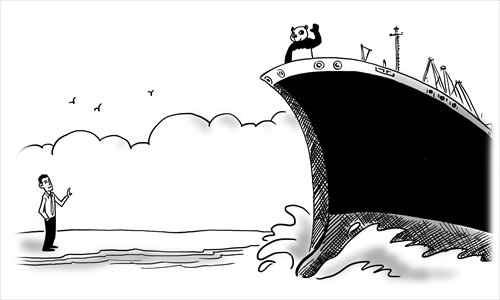Vietnam offers China shared ideology and deeper trade

Illustration: Liu Rui/GT
Southeast Asia has, as always, been a focus in China's recent peripheral diplomacy. However, this region is also contested by the US, Japan, India and others, adding to the complexity for China to fully implement its foreign policies.
The Southeast Asian heads of state view external countries as "elephants" and they welcome the powers to graze on the vast land but are reluctant to see them tussling with each other to sabotage the "tender grass." Thus they aim at pursuing a balance of power.
China, as a great power, should understand the mentality of these nations, make comprehensive diplomatic efforts and strengthen economic and political cooperation with countries on the Indo-China Peninsula and in particular Vietnam.
Though a relatively small country, Vietnam has a certain geopolitical and economic influence on Southeast Asia. Located in the intermediate zone of Southeast Asia, Vietnam falls back on China to the north, borders many countries on the Indo-China Peninsula and faces the Philippines, Indonesia and Malaysia through the long coastline of the South China Sea.
As a rising power in the world, China needs to attach importance to the position of Southeast Asia in global geopolitics and pay particular attention to Vietnam given its important strategic location.
Since the Doi Moi (Renovation) policy, initiated in 1986 with the goal of creating a socialist-oriented market economy, Vietnam has scored universally acknowledged achievements similar to those of China, successfully making itself an emerging star in Southeast Asia.
It is, therefore, ranked among the VISTA (Vietnam, Indonesia, South Africa, Turkey and Argentina) and the Next Eleven (Bangladesh, Egypt, Indonesia, Iran, Mexico, Nigeria, Pakistan, the Philippines, Turkey, South Korea, and Vietnam), two powerful development groups that represent a second-tier of up-and-coming nations in this century.
China, which urgently needs to broaden its external market, cannot afford to neglect this neighbor whose population will soon reach 100 million.
In the light of imbalances in economic development, countries of the Association of Southeast Asian Nations (ASEAN) have been divided into new and old spheres and Vietnam is viewed as a sparkling state in the new ASEAN world.
Consequently, deepening its economic and trading collaboration with Hanoi in a comprehensive way should become a priority of Beijing's peripheral diplomatic endeavor.
In addition, Vietnam and China share common ground and consistency in terms of ideology and social system as both are socialist nations. Whether the socialist cause will see a revival in the future is mainly up to the development and influence of Beijing and Hanoi.
There is no denying that China and Vietnam still remain in the quagmire of a row over the South China Sea, where disputes over the Nansha Islands have persisted for many years and continued to shadow the ties between the two neighbors, but the territorial dispute and controversies should not dominate the bilateral relations.
Through a series of peaceful negotiations and consultations, Beijing and Hanoi have reached an agreement on the delimitation of the Beibu Bay, signed a pact on fishery cooperation as well as a treaty on the demarcation of their land border, as a result of resolving the long-standing contention over two-thirds of the territories in dispute.
This is not only a milestone in the development course of their bilateral ties, but also a rare event in the modern history of international relations.
At present Sino-Vietnamese relations are at a critical turning point and the future development will depend on the foreign policies both sides adopt. The two nations are expected to meticulously put in place the wide spectrum of consensuses they have agreed on to further elevate their bilateral ties to a new phase.
The author is an honorary member of the Chinese Academy of Social Sciences. opinion@globaltimes.com.cn